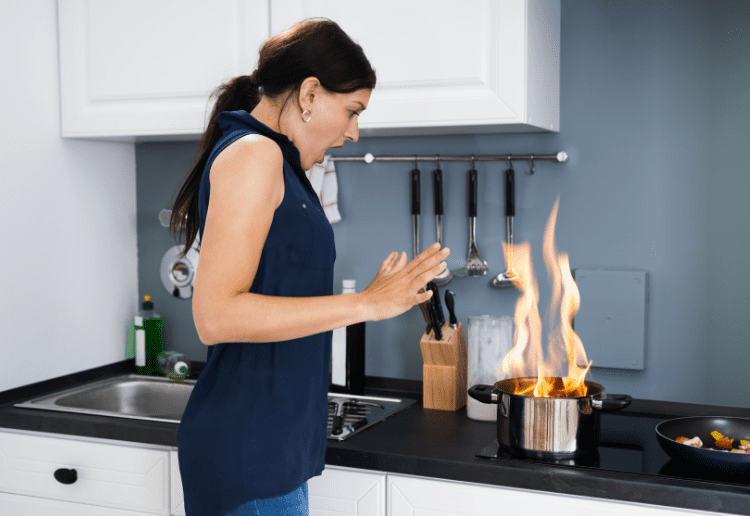Fires in the home are almost always preventable, and even one death is one too many. Fire safety at home should be a priority for all families, it’s important to understand all of your home’s potential fire hazards and how to minimise your risks.
It’s generally only after a home fire that people reflect on what they could have done differently to minimise the risks.
A fire can start in your home any number of ways. Here is an overview of the most common home fire hazards and how to avoid them:
Cooking
Cooking is the number one cause of house fires and injuries. A kitchen fire can start from grease spills, accidentally leaving a towel too close to the stove, leaving food unsupervised on a burner or in the oven, forgetting to turn the coffee pot off, a toaster flare-up, and more. The good news is you can minimise the risk of each by following some important kitchen fire safety tips, including:
- Be present and alert when using the stovetop or oven.
- Never leave the kitchen when boiling, broiling, grilling, or frying food.
- Use a timer and regularly check the food when baking, roasting, or simmering.
- Avoid wearing loose-fitting clothing.
- Keep towels, paper towels, and other flammable items away from your stovetop.
- Make sure any skillet or pot handles are turned in to avoid being bumped and knocked over.
- Supervise your children whenever they are cooking in the kitchen.
Heating
Next to cooking, heating is another primary cause of home fires. From portable heaters to fireplaces, there are obvious reasons of concern when heating your home. Here are some tips to keep your home safe and fire-free when staying warm this winter:
- Keep clothing, paper, and other flammables at least three feet away from your fireplace or a space heater.
- Turn off heaters and check the fireplace to make sure all embers are extinguished prior to leaving the room.
- Keep your fireplace clean and debris-free.
- If using a portable space heater, place it on a flat, non-flammable surface and not on carpet or a rug.
- Only burn wood and use a fireplace screen to keep sparks and embers from jumping out.
- Keep space heaters away from children and pets.
- Make sure the fire is completely extinguished before going to bed or leaving the house.
- Read the directions and understand how to properly use a space heater prior to using it.
- Have a professional clean the chimney every summer or fall.
Electrical Outlets, Cords, and Appliances
Electrical issues are another common cause of many house fires. Electrical fires can spark up out of nowhere from using electric appliances with frayed cords or loose plugs, using lightbulbs with incorrect wattage, and overloaded outlets and circuits. To avoid sparking a fire in your home, follow these fire safety tips:
- Only use appliances in good operating condition, including the cords and plugs.
- Avoid overloading outlets with too many plugs from your TV, stereo, computer, gaming system, and so on.
- Use lightbulbs with the correct wattage and keep lamps and nightlights away from drapes, bedding, and other fabrics.
- Use plastic safety covers for unused outlets.
- Make sure small children are supervised when using electric appliances and devices.
- Be careful when using electric blankets.
- Install circuit interrupters to shut off faulty circuits and prevent electrical shock.
Matches, Candles, and Smoking
Despite being responsible for fewer house fires than cooking, heating, and electrical issues, cigarettes are the leading cause of fire-related deaths. Candles and matches can be equally dangerous. If you smoke or use candles or matches, here are some tips to minimise your fire risks:
- Do not smoke in your home. If you do, avoid smoking in bed.
- Never put a lit cigarette in the trash.
- Make sure the cigarette is out completely before leaving the room.
- Always keep lighters, matches, and any flammable materials away from children.
- Keep candles away from furniture and curtains.
- Try using flameless candles.
- Extinguish candles before leaving the house or going to bed.
- Place candles in sturdy, non-flammable holders.
Check Your Smoke Alarms
Nearly 2/3 of all fire deaths take place in homes without working smoke alarms. While they can’t prevent a home fire, these early warning devices can help give you and your family enough time to exit your home safely should a fire occur. To keep your family safe, follow these smoke alarm tips:
- Make sure smoke alarms are installed inside every room and on each level of your home.
- Regularly test your home’s smoke alarms once a month.
- Replace the batteries as needed or at least once a year.
- Replace smoke alarms more than 10 years old.
- Consider installing special smoke alarms with strobe lights for added safety.
Make a Fire Escape Plan
On average, a home fire takes place every 90 seconds. Once a smoke alarm begins to sound, you may only have a couple of minutes to escape. Therefore, a fire escape plan is a must. When making an escape plan, begin by sketching a map of your home. For each room, plan not just one but two ways to escape. Beyond that, plan secondary escape routes, such as down a collapsible ladder located under an upper-story window or out of a window and onto a neighbouring roof. Lastly, designate a meeting place outside your home or building to meet up with others should a fire occur. On a final note, if you live in a multi-story condo or apartment building, always use the stairs – not the elevator. Also, don’t just create a plan and forget about it. Instead, put the plan into action by practicing crawling low on the floor, trying to escape with your eyes closed, and so on. As is the case with everything else, practice makes perfect.
Be Prepared
Following each of these tips is critical for home fire safety, but the number one way to protect your home and family from fire danger is preparation. Understanding the fire prevention rules and making sure your home is outfitted with the right equipment is a must.
Aegis Safe can help if you require fire safety equipment or fire extinguisher testing. For more fire safety information and tips you can visit www.AegisSafe.com.au.




















9:18 pm
10:59 am
8:24 am
3:03 pm
10:53 am
1:30 pm
1:44 pm
8:54 pm
10:29 am
8:34 am
8:34 am
9:36 am
11:30 pm
3:28 pm
11:51 am
6:23 am
3:00 am
-

-
-
Ellen replied
- 04 Sep 2021 , 6:25 am

Reply1:16 am
11:57 pm
11:17 pm
- 1
- 2
- »
Post a commentTo post a review/comment please join us or login so we can allocate your points.